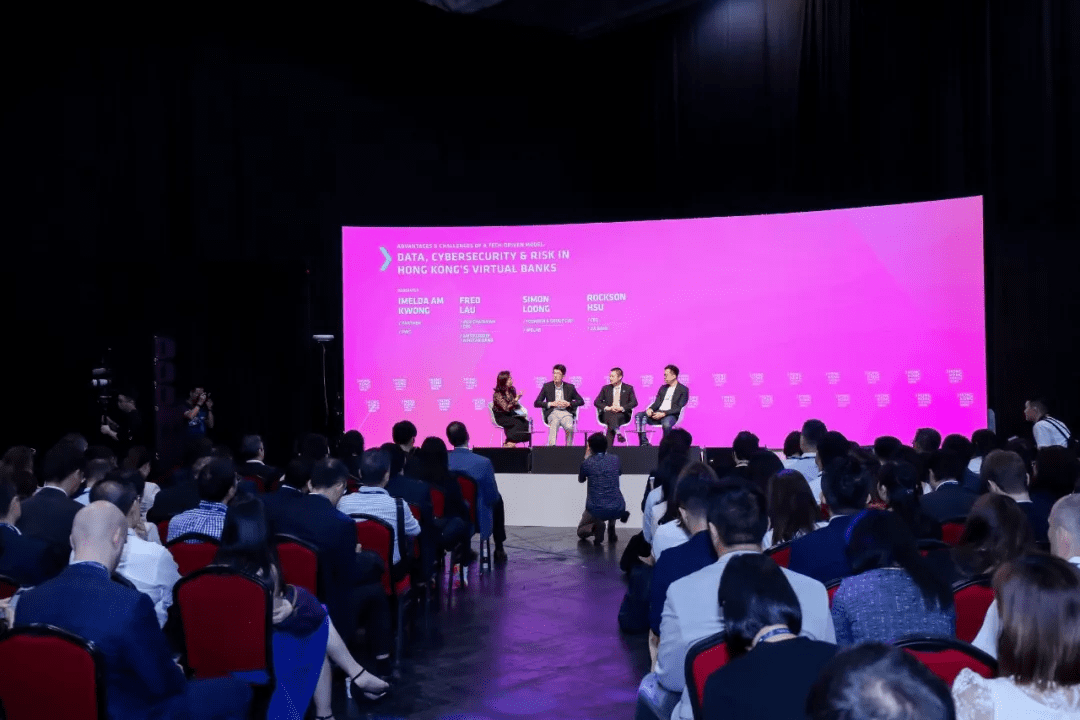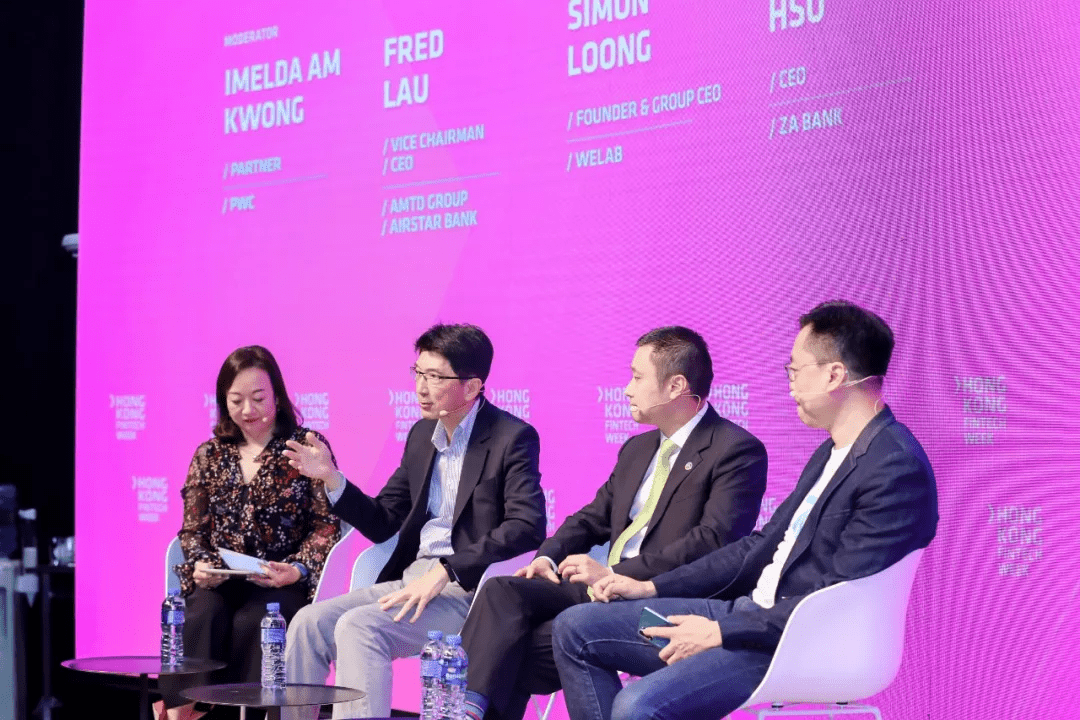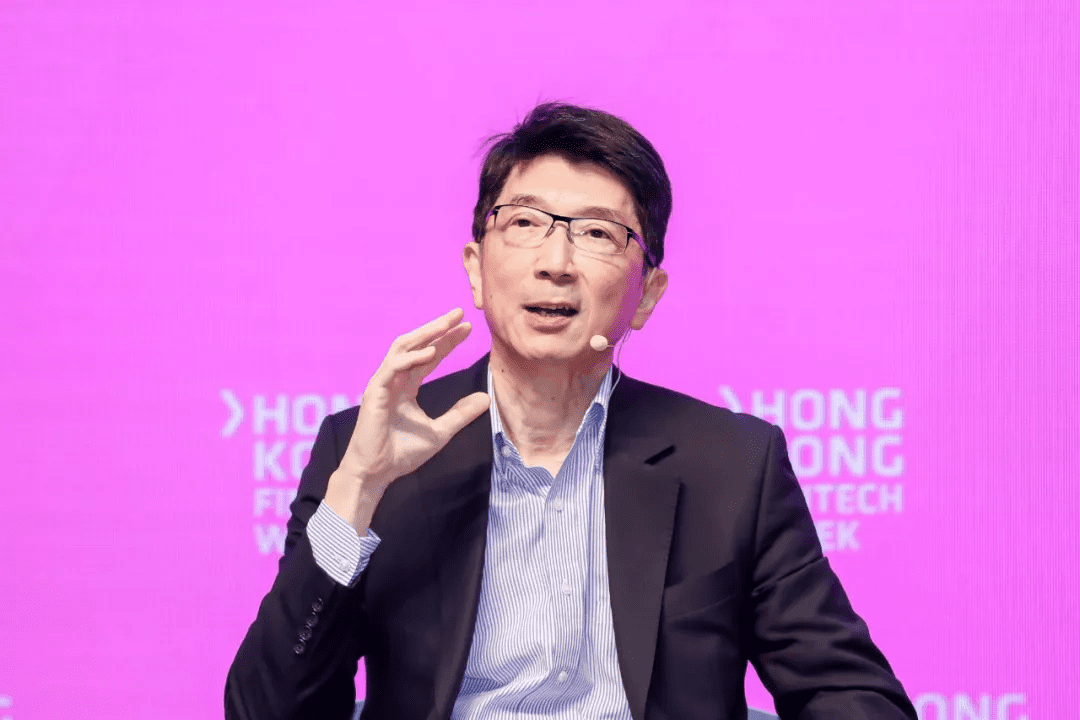Hong Kong Fintech Week
Organized by InvestHK, a HKSAR government department, supported by the Hong Kong Monetary Authority (HKMA), the Securities and Futures Commission (SFC), the Insurance Authority (IA) and the Hong Kong Stock Exchange (HKEX), and with AMTD Group as the sole strategic partner, Hong Kong Fintech Week 2019 took place from November 4th to 8th in Hong Kong and Shenzhen. This is the second year in a row that AMTD Group serves as a sole strategic partner for Hong Kong Fintech Week.
On the Growth Stage of “Hong Kong Fintech Week 2019”, Dr. Frederic Lau, Vice Chairman of AMTD Group and CEO of Airstar bank, Rockson Hsu, CEO of ZA Bank, and Simon Loong, Founder and CEO of WeLab, were invited to join the panel discussion on the topic of “Advantages and Challenges of a Tech-Driven Model: Data, Cybersecurity & Risk in Hong Kong’s Virtual Banks”. This panel discussion was chaired by Imelda AM Kwong, Partner at PwC.

Dr. Frederic Lau, Vice Chairman of AMTD Group and CEO of Airstar bank, shared his thoughts on the upcoming revolution brought by Hong Kong virtual banks and changes of Hong Kong banking industry. He said that since the virtual banking concept was implemented to Hong Kong, the whole banking industry has been undergoing significant changes. Traditional banks are changing their ways to serve clients. On the other hand, the implementation of virtual banking also changes customers’ understanding of the services provided by banks and their way of using these services. It requires a customer education. Regulatory authority should partner with virtual banks to educate our customers and implement this fintech revolution into every customers’ daily life together.

Rockson Hsu, CEO of ZA Bank, believed that virtual banking will reshape the way that customers use banking services and let them experience the changes brought by financial technology and innovation. Simon Loong, Founder and CEO of WeLab, added that the implementation of virtual banking means a more reasonable price and better customer experience.
Regarding the virtual banking cybersecurity and risk, Dr. Frederic Lau first indicated that taking good care of internet security and data risk was crucial for earning the confidence of customers. Second, too many security barriers in the virtual banking system would affect customer experience. And last, we need to identify the key points that regulatory authority should focus on. Usually, Regulatory authorities in Hong Kong act carefully on these matters.

Simon Loong emphasized the importance of the way virtual banks utilizing data. The key to data security is data saving and reliability of the access. Only saving the data at local terminal is an effective method to reduce the risk. On the other hand, using AI, machine learning technology and big data to analyze customer can reduce the credit risk and prevent financial fraud.
While discussing the Hong Kong virtual bank’s performance on handling AML, KYC and transaction issues, Dr. Frederic Lau indicated that we acquired a digital full banking license which means we must comply with banking regulations from all aspects. While handling on AML, KYC and transaction works, we follow the strictest regulation as the traditional banks. All the eight virtual banks pay lots of attention and work hard on these matters.
While talking about the potential for virtual banks in the next three years, Dr. Frederic Lau mentioned that with the integrating advantage in Greater Bay Area and the Xiaomi’s global operating experience in China, Southeast Asia and Europe, Airstar bank possesses strong advantages and will further make these advantages into grate success. Rockson Hsu believes that Hong Kong is just a start for virtual banking. We hope to establish an applicable and sustainable business model in Hong Kong and then expand to the Greater Bay Area. It is what regulatory authorities are looking forward to as well.
Regarding to the difficulties that the traditional banks might face during the transformation, Dr. Frederic Lau indicated that existing banks have to overcome the burdens as traditional banks during their transformation to digital banks. Even though traditional banks and virtual banks share similar concept, it does not guarantee a traditional bank can build a successful virtual bank. Simon Loong believed that traditional banks’ business model is based on the network of their branches, while virtual banks are focusing on online and digital operation. He inferred that there will not be too many traditional banks applying for virtual banking license.